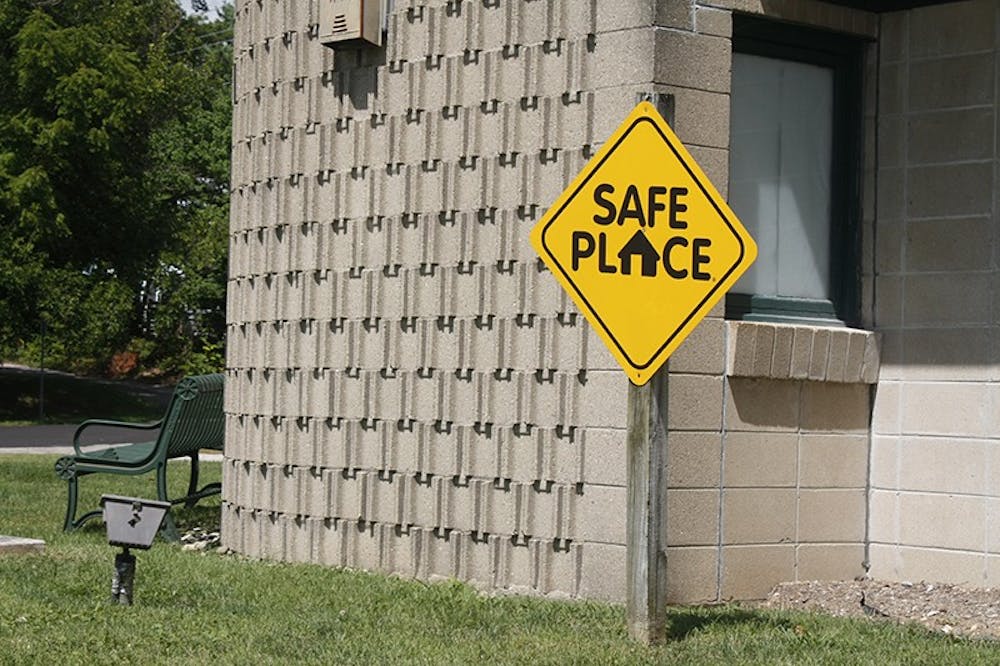Multiple organizations in the Monroe County area serve youth seeking support and enrichment. These organizations offer shelter, mentoring and after-school activities.
Safe Place of Monroe County, a division of the national Safe Place organization, is a community-wide outreach service for at-risk youth in crisis situations. Program coordinator Brigitt Nasby said the program mainly focuses on helping those who are unhoused and those diagnosed with a mental illness offering youth-in-need shelter and counseling. While the program primarily serves youth ages 10 – 17, Safe Place can also help people 18 – 22 years old with creating a safety plan and getting connected to long-term resources. The Monroe County program, run by the Youth Service Bureau, has been operating since 1987.
To utilize Safe Place services, those ages 10-22 can look for yellow-and-black Safe Place signs in windows of local businesses and community facilities, Nasby said. When inside, they can go to a staff member and alert them they want to use Safe Place. That staff member will then call the Youth Services Bureau, who will send a program coordinator or counselor to speak with the person.
Nasby said there are approximately 90 Safe Place locations throughout Monroe County.
[Related: Local shelter makes plans to support the unhoused community with onsite care]
After contacting Safe Place, Nasby said, kids often choose to stay at the Youth Services Bureau’s Binkley House Emergency Youth Shelter, which provides emergency short-term programs for unhoused youth and youth in crisis situations. However, Nasby said the program empowers youth to have a voice in how they get help. They can choose to only obtain counseling through Safe Place, or ask for help with contacting law enforcement. They’re also free to seek further support somewhere else entirely.
“We advocate with youth, we advocate on their behalf, but in tandem with what they think as well,” Nasby said.
She said she encourages college students to volunteer with Safe Place and refer it to those who might need it.
“It’s that community sense of looking out for one another,” Nasby said. “Whether you think you’re going to use it or not, having that resource is always a good thing.”
Big Brothers Big Sisters is another organization available to youth in the Monroe County area. In Big Brothers Big Sisters, children and youth ages 6 - 18, called “Littles,” are matched with “Bigs,” adult mentors who volunteer to provide companionship and guidance through activities like playing games, visiting the library or talking and catching up with one another.
Elizabeth Mascharka is the fund development and marketing specialist at Big Brothers Big Sisters of South Central Indiana. She said kids enter into the program for a variety of reasons — some may need a trusted adult in their life or a safe space to attend after school, for example, or may be an only child seeking friendship.
“We just see that there’s such an array of adversity that individuals come in with, and we want to be that safe and accommodating space no matter what someone is experiencing or going through, if anything at all,” Mascharka said.
She said there are currently more than 250 children already matched or who are waiting to be matched into the program, she said.
Big Brothers Big Sisters is also developing a “Big Futures” program, which provides mentorship to people up to age 24. An extension of the standard mentorship, Big Futures allows “Littles” who age beyond 18 while in the program to receive support with matters like education, financial literacy and career development as they transition into adulthood.
While volunteering, “Bigs” are required to dedicate two to four hours per month to their “Little” for at least one year. However, Mascharka said, many mentor relationships continue for years. She said one-on-one mentoring helps build trust and fosters closer relationships than are often possible in group settings.
“You’re able to have real conversations with your Big and with your Little and kind of create a space that feels like a tighter-knit relationship versus having a person speaking to a group as a whole and you feeling like you’re not necessarily being heard,” Mascharka said.
When they’re out of school, young children and youth grades K–12 can attend the Boys & Girls Clubs of Bloomington , which provides after-school programming and full-day camps during breaks.
[Related: Monroe County Youth Services Bureau sets out to reduce truancy, substance abuse]
Courtney Payne-Taylor, operations director at BGC Bloomington, said the organization typically offers more than 70 different programs in a given year, including programs for music, sports, health and wellness, and leadership.
The effects of the COVID-19 pandemic left many kids struggling with learning loss, Payne-Taylor said. The Boys & Girls Clubs also offers academic support, working with local school systems to align the subjects the organization teaches kids after school with the material they learn during school.
Leslie Abshier, resource development director, said participating in multiple extracurricular activities typically means families must take the time to drive around town and spend significant amounts of money. Many kids come to the Boys & Girls Clubs, she said, because it allows them to access several different programs each day in one location for a membership of $20 per year.
Some of the most impactful moments, Payne-Taylor said, are watching kids come out of their shell as they participate in the activities at BGC Bloomington.
“Finding their voice, feeling more comfortable with their peers in the club, developing better adult relationships,” she said. “We really see these moments on a regular basis.”




